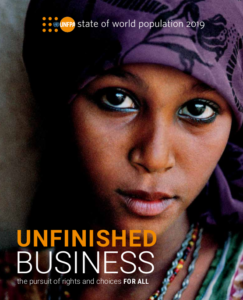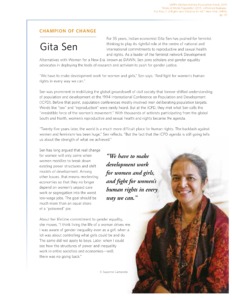 It has now been 50 years since the United Nations Population Fund (UNFPA) was established and 25 years since the landmark International Conference on Population and Development (ICPD) in Cairo with its global commitment to sexual and reproductive health and rights. The 2019 State of World Population (SWOP) report from UNFPA discusses the – Unfinished business: the pursuit of rights and choices for all – both at a global and at a personal level. The report highlights the remarkable gains in sexual and reproductive health and rights since ICPD. It includes stories of women who have benefited from policy and funding changes, as well as voices of ‘champions of change’: women and men who have fought for these rights.
It has now been 50 years since the United Nations Population Fund (UNFPA) was established and 25 years since the landmark International Conference on Population and Development (ICPD) in Cairo with its global commitment to sexual and reproductive health and rights. The 2019 State of World Population (SWOP) report from UNFPA discusses the – Unfinished business: the pursuit of rights and choices for all – both at a global and at a personal level. The report highlights the remarkable gains in sexual and reproductive health and rights since ICPD. It includes stories of women who have benefited from policy and funding changes, as well as voices of ‘champions of change’: women and men who have fought for these rights.
Yet, despite progress having been made, hundreds of millions of women today still face economic, social, institutional and other barriers that prevent them from making their own decisions about whether, when, how often and with whom to become pregnant. They still do not have access to contraceptives, girls and women still face sexual violence and suffer from harmful traditional practices including child marriages. They do not have access to affordable, high quality health services or comprehensive sexuality education. They lack the power to make decisions about their own bodies, and have to struggle individually and collectively against powerful forces, including religious forces that oppose advances towards gender equality and the respect, protection and fulfilment of girls’ and women’s human rights.
The report recognizes that “of all the obstacles to the achievement and exercise of human rights, few have proven to be as challenging to overcome as those based on gender. Gender, the web of expectations and norms within a society that together define what are appropriate male and female behaviours, roles and characteristics, is learned, internalized and reinforced through social interactions with others, thus having a profound influence on every domain of life” (p. 73).
“[…] We must push back against forces that would see us return to a time when women had little say in reproductive decisions or, for that matter, in any area of their lives. The fight for rights and choices must continue until they are a reality for all” (p. 4), says Natalia Kanem, United Nations Under-Secretary-General and Executive Director of UNFPA.
DAWN’s General Co-coordinator, Gita Sen is one of the “champions of change” whose work is highlighted by the SWOP report. “Sen was prominent in mobilizing the global groundswell of civil society that forever shifted understanding of population and development” (p. 79) at the 1994 ICPD, when “the irresistible force of the women’s movement” -in Sen’s words- was demonstrated. “Twenty-five years later, the world is a much more difficult place for human rights. The backlash against women and feminism has been huge,” (p. 79) Sen reflects, “But the fact that the ICPD agenda is still going tells us about the strength of what we achieved” (p. 79).
Though tremendous progress has been made in advancing sexual and reproductive rights over the last 25 years, the future requires directly challenging the linkages between gender inequality, sexuality and reproduction and the patriarchal social norms that reinforce them. This will depend, in no small part, on how the world takes forward the ICPD achievements and addresses the shortfalls.

